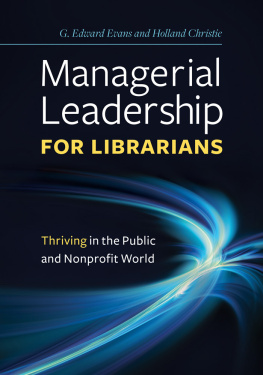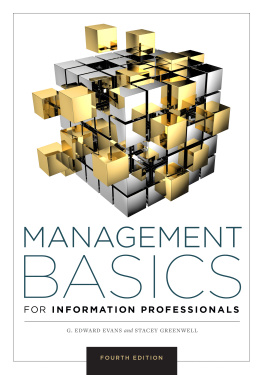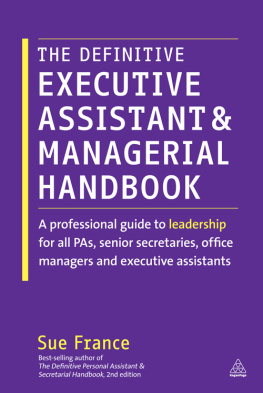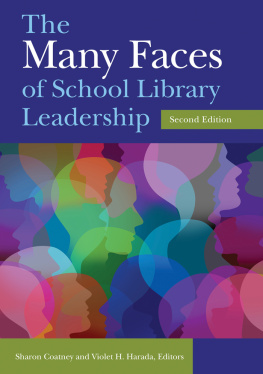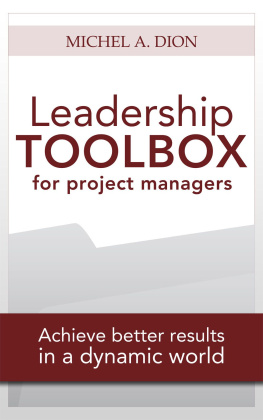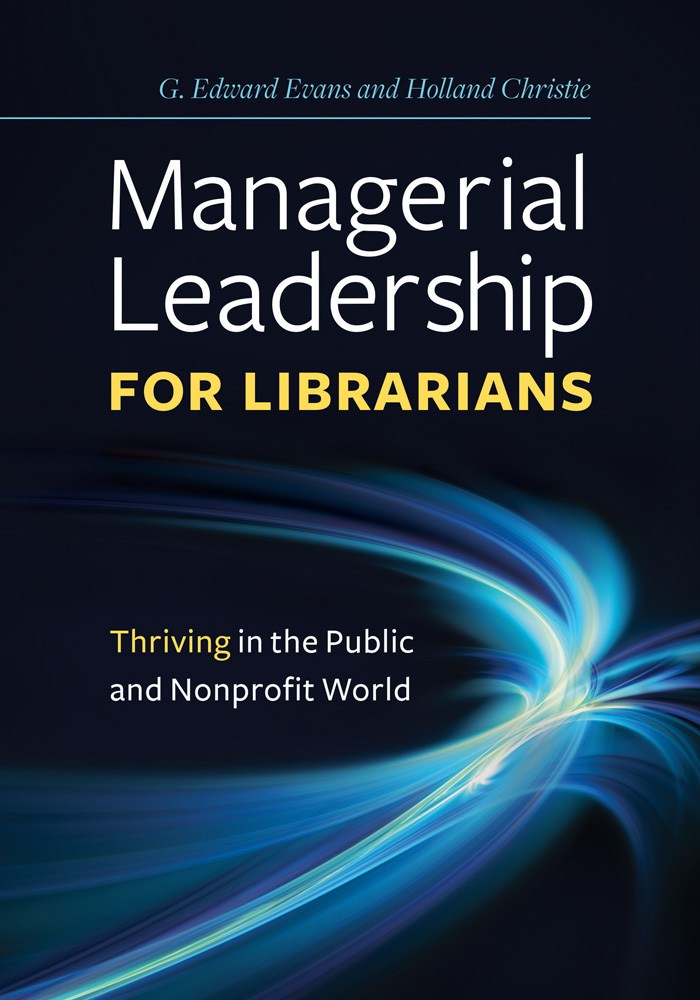Managerial Leadership for Librarians
Copyright 2017 G. Edward Evans and Holland Christie
All rights reserved. No part of this publication may be reproduced, stored in a retrieval system, or transmitted, in any form or by any means, electronic, mechanical, photocopying, recording, or otherwise, except for the inclusion of brief quotations in a review, without prior permission in writing from the publisher.
Library of Congress Cataloging-in-Publication Data
Names: Evans, G. Edward, 1937- author. | Christie, Holland, author.
Title: Managerial leadership for librarians : thriving in the public and nonprofit world / G. Edward Evans and Holland Christie.
Description: Santa Barbara, California : Libraries Unlimited, an imprint of ABC-CLIO, LLC, [2017] | Includes bibliographical references and index.
Identifiers: LCCN 2017035038 (print) | LCCN 2017036676 (ebook) | ISBN 9781440841712 (eBook) | ISBN 9781440841705 (paperback : acid-free paper)
Subjects: LCSH: Library administrationUnited States. | Public librariesUnited StatesAdministration. | LibrariesAims and objectivesUnited States. | Public administration. | Nonprofit organizationsManagement. | Leadership. | Library scienceVocational guidance.
Classification: LCC Z678 (ebook) | LCC Z678 .E925 2017 (print) | DDC 025.10973dc23
LC record available at https://lccn.loc.gov/2017035038
ISBN: 978-1-4408-4170-5
EISBN: 978-1-4408-4171-2
212019181712345
This book is also available as an eBook.
Libraries Unlimited
An Imprint of ABC-CLIO, LLC
ABC-CLIO, LLC
130 Cremona Drive, P.O. Box 1911
Santa Barbara, California 93116-1911
www.abc-clio.com
This book is printed on acid-free paper 
Manufactured in the United States of America
CONTENTS
The foundation upon which we prepared this book consists of four assumptions. The first assumption is that the reader has become or is becoming familiar with the core concepts of managing any type of organization. That in turn relates to our second assumptionthat there is a core set of management concepts and activities that every manager knows and performs. Certainly those concepts and activities are modified, to a greater or lesser extent, depending upon the organizational context and mission, regardless of sector: for-profit, nonprofit, or public. Thus, we make passing references to such core concepts in various chapters, but do not explore them in any depth.
Our third assumption is reflected in the books subtitle: our focus is on the nonprofit and public sector. The vast majority of libraries exist in one or both of those sectors. Librarian managers must understand how these environments require modifications of the basic managerial core concepts as well as include some managerial issues that do not exist in for-profit sector organizations. Some of the major differences between sectors are explored in . The subsequent 20 chapters look at such basic areas such as accountability, budgeting, and leadership, while noting sector differences. Certain chapters contain information that is more sector-specific, such as fundraising and politics.
Finally, the fourth assumption is our belief that truly successful organizational careers arise from someone having a mastery of both managerial concepts and very strong leadership skills. A person may have a useful career being an outstanding manager while being a weak leader, and vice versa. Outstanding organizational outcomes are a result of having senior administrators who excel in both areas. Because of our belief we use the phrase managerial leader throughout this book.
As has been our pattern in collaborating on other book projects, we make extensive use of sidebars throughout this book. Their primary purpose is to identify resources you can use for further information about the ideas covered in a chapters main text. To a lesser extent we employ sidebars to provide examples of first-hand experiences of the authors and advisory board members from their on the floor practical experiences relate to the chapter context.
We were fortunate to have an outstanding group of advisors/readers on this project. They read draft chapters as we finished each one. Their feedback helped us improve the quality of every chapter. The members of this group were as follows:
DR. CAMILA A. ALIREDean Emerita at the University of New Mexico and Colorado State University. Alire received her doctorate in Higher Education Administration from the University of Northern Colorado and her MLS from the University of Denver. She is past President (20092010) of the American Library Association (ALA) and past President (20052006) of the Association of College and Research Libraries (ACRL) and also past President of the nation REFORMA (the National Association to Promote Library and Information Services to Latinos and the Spanish-speaking).
DR. JOSEPH MIKAProfessor Emeritus at the School of Library and Information Science, Wayne State University (Detroit, MI). Mika served as Director of the School twice (for a total of 15 years) during his tenure of 25 years at the university. He was also Assistant Dean at the School of Library and Information Science, University of Southern Mississippi (Hattiesburg); Assistant Library Director at Johnson State College (Johnson, VT); and Assistant Library Director, Ohio State University, Mansfield Campus. His teaching areas included administration, customer service, personnel management, and collection development. He is co-owner of Hartzell-Mika Consulting, a firm that has been in business since 1999, providing assistance with library director searches, strategic planning facilitation, facility development and planning, and staff and board training sessions. Mika is a retired colonel in the U.S. Army, having served 29 years in the Army Reserves.
DR. PATRICIA LAYZELL WARDSemi-retired; currently Ward is Honorable Archivist to the Festiniog Railway Company. Ward has worked in public and special libraries and enjoyed a long involvement in teaching and research. This included posts as Director of the Centre for Library and Information Management at Loughborough University and Chairs in Library and Information Studies at Curtin University, Perth, Western Australia, and the University of Wales Aberystwyth. She is Emeritus Editor of Library Management, author of conference papers and journal articles, examiner to a number of universities and has consulted in Europe, South America, Southeast Asia, and Australia. She holds a masters and PhD from University College London.
MARGARET ZARNOSKY SAPONARO, MLSHead of Collection Development at the University Libraries, University of Maryland (UMD). Saponaro is responsible for providing leadership and vision for the content of purchased and licensed collections across all disciplinary areas and formats in the UMD libraries. She also directs the collection development work of the Libraries subject specialist liaison librarians, with primary responsibility for content and budgeting of the UMD libraries general collections. Her prior work experience includes serving as librarian for journalism and for hearing and speech sciences and also as manager of staff learning and development at the University of Maryland; as associate director of learning resources at the Alexandria campus of Northern Virginia Community College; and as librarian for the College of Human Resources at Virginia Polytechnic Institute and State University. Saponaro has also served as an adjunct faculty member for the University of Virginia and is currently a member of the ALA and ACRL. She holds a masters degree in library science from the University of California, Los Angeles, with postgraduate work in the areas of personnel programs and public administration. Her research interests are in the areas of collection management, instruction, and emerging technologies in libraries.

